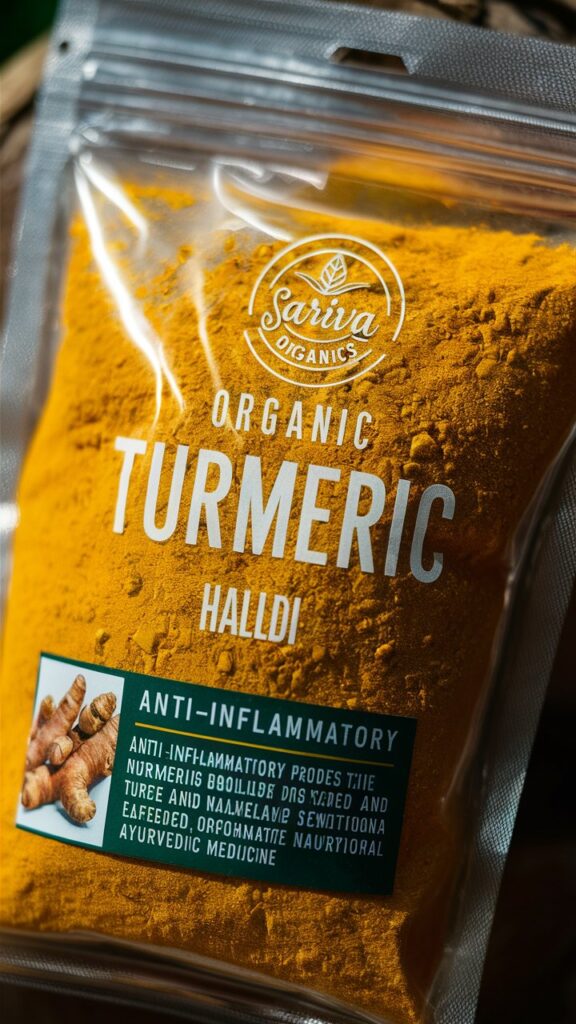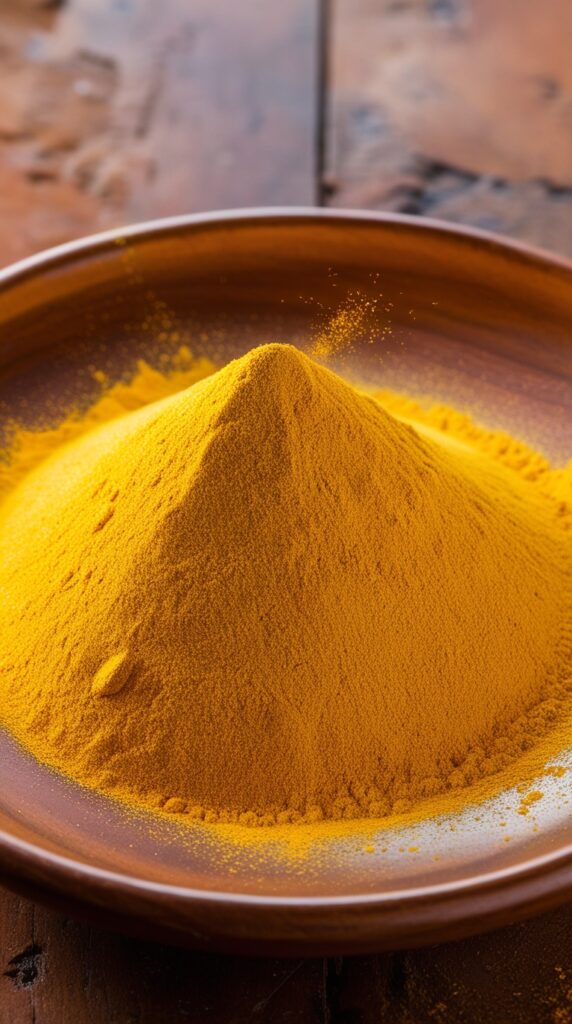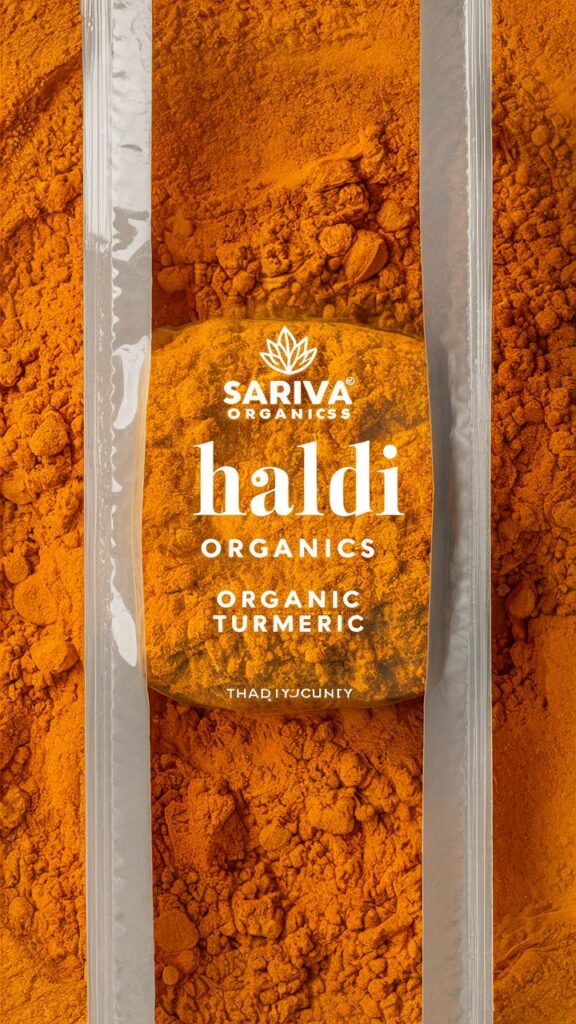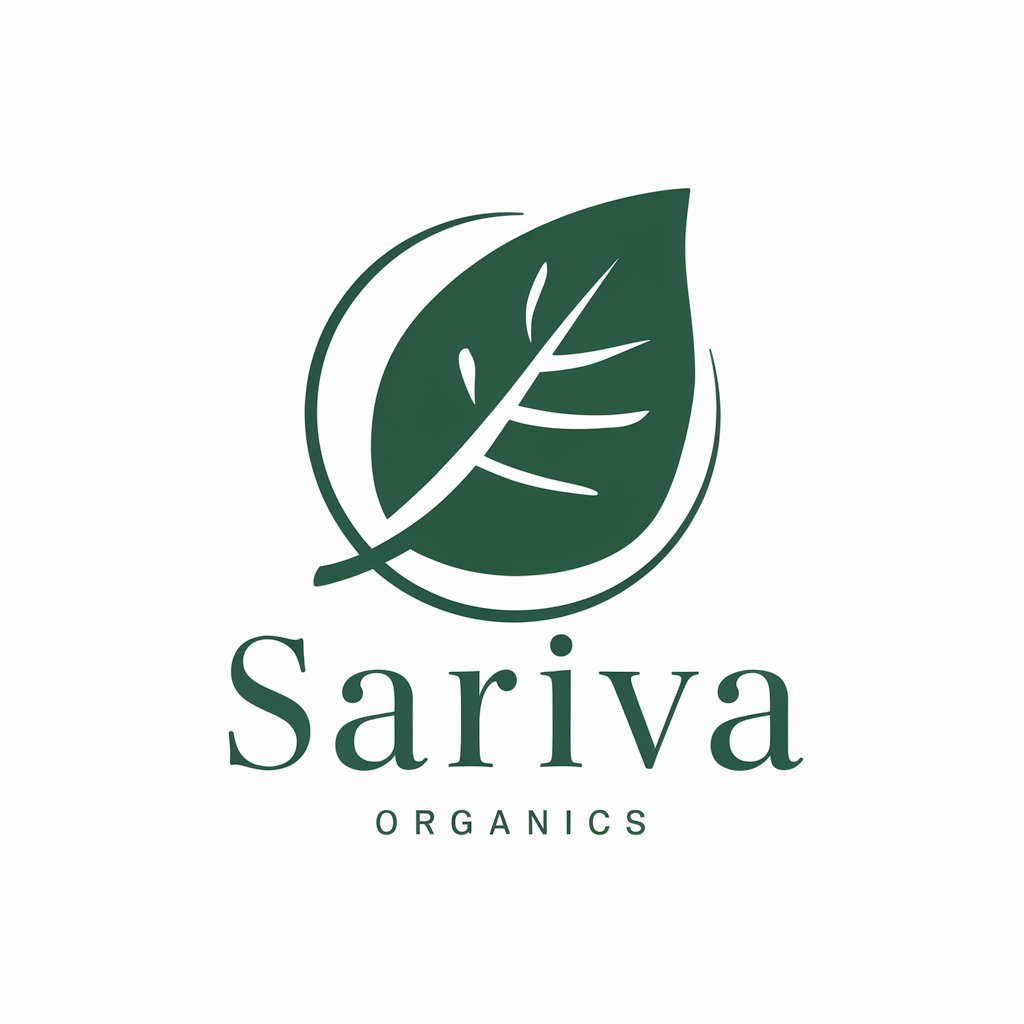Namaste! I’m Shashi, and today I want to talk about something that has been a part of my life and my kitchen for as long as I can remember—turmeric, or as we call it in India, Haldi. Turmeric is not just a spice; it’s a golden treasure trove of health benefits that has been celebrated in Indian culture for centuries. From our grandmothers’ beauty routines to our mothers’ secret curry recipes, Haldi has been a staple in Indian households.
In recent years, the world has started to catch on to what we have known all along—the incredible health benefits of turmeric. As someone deeply rooted in organic farming and natural living, I have seen firsthand how powerful this humble spice can be. At Sariva Organics, we take great pride in producing pure, organic turmeric right from our farm in Uttarakhand, ensuring that it retains all its natural goodness.
Understanding the benefits of turmeric is essential for anyone looking to improve their holistic well-being. In this article, I’ll share everything you need to know about turmeric, from its nutritional profile and health benefits to how you can incorporate it into your daily routine.
Key Takeaways
- Anti-inflammatory Properties: Turmeric, especially its active compound curcumin, helps reduce inflammation and manage chronic inflammatory diseases.
- Antioxidant Benefits: Curcumin combats oxidative stress, promoting overall health and slowing the aging process.
- Immune System Boost: Regular consumption of turmeric enhances immunity, preventing infections and diseases.
- Digestive Health: Turmeric aids digestion and supports gut health, beneficial for treating digestive disorders.
- Joint and Muscle Health: Its anti-inflammatory effects relieve joint pain and support muscle recovery, especially for arthritis sufferers.
- Organic vs. Market Turmeric: Organic turmeric from Sariva Organics is free from harmful adulterants, ensuring maximum health benefits.
- Culinary Uses: Turmeric is versatile in traditional and modern recipes, enhancing flavor and providing health benefits in cooking.
Benefits of Organic Castor Oil
What is Turmeric?

Turmeric, known as Haldi in Hindi, is a vibrant yellow-orange spice that comes from the root of the Curcuma longa plant, a member of the ginger family. Native to Southeast Asia, turmeric has been a cornerstone of Indian culture and cuisine for thousands of years. It thrives in the tropical climates of India, where it has been cultivated and cherished not just as a culinary ingredient, but also for its medicinal properties.
Historically, turmeric has held a significant place in traditional Indian medicine, particularly in Ayurveda and Siddha practices. Ancient Ayurvedic texts refer to turmeric as “Haridra” and “Jayanti,” which signify its auspicious and health-promoting qualities. It was used to treat a variety of ailments, from digestive issues and skin problems to respiratory conditions and joint pain. Turmeric’s medicinal applications were not limited to India; it also found its way into Traditional Chinese Medicine and other healing systems across Asia.
The primary active compound in turmeric is curcumin, a powerful antioxidant and anti-inflammatory agent. Curcumin is what gives turmeric its distinctive yellow color and is responsible for many of its health benefits. However, curcumin constitutes only about 2-5% of turmeric by weight. This compound has been extensively studied for its potential to combat a variety of diseases, including cancer, heart disease, and neurodegenerative conditions.
In addition to curcumin, turmeric contains other beneficial compounds like demethoxycurcumin and bisdemethoxycurcumin, as well as essential oils such as turmerone, atlantone, and zingiberene. These compounds work synergistically to enhance turmeric’s therapeutic effects.
Turmeric’s rich history and potent bioactive compounds make it a remarkable spice that bridges the gap between food and medicine. Whether used in traditional dishes, as a natural dye, or in healing rituals, turmeric continues to be a vital part of our lives, celebrated for its myriad benefits and versatile applications.
Benefits of Organic Sesame Oil
Nutritional Profile of Turmeric

Turmeric, or Haldi, is a nutritional powerhouse packed with essential vitamins and minerals that contribute to its wide array of health benefits. While it’s primarily known for its active compound curcumin, turmeric’s complete nutritional profile offers a broader spectrum of nutrients that enhance its medicinal value.
Vitamins and Minerals
Turmeric is rich in vitamins such as vitamin C, vitamin E, and several B vitamins including B6, B3 (niacin), B2 (riboflavin), and B1 (thiamine). These vitamins play crucial roles in supporting immune function, skin health, and energy metabolism. Additionally, turmeric contains important minerals like iron, manganese, potassium, and magnesium. Iron is vital for blood production, while manganese supports bone health and metabolism. Potassium helps regulate blood pressure, and magnesium is essential for muscle and nerve function.
Curcumin: The Star Compound
Curcumin is the most studied compound in turmeric, renowned for its powerful anti-inflammatory and antioxidant properties. This polyphenol not only gives turmeric its vibrant color but also provides a host of health benefits. Curcumin helps reduce inflammation by inhibiting certain molecules that play a role in the inflammatory process, making it effective in managing conditions like arthritis and inflammatory bowel disease. Its antioxidant capacity protects the body from free radicals, potentially lowering the risk of chronic diseases such as heart disease, cancer, and Alzheimer’s.
Comparison with Other Spices
When compared to other spices, turmeric stands out due to its unique combination of nutrients and bioactive compounds. For instance, black pepper contains piperine, which, interestingly, enhances the absorption of curcumin, making turmeric even more potent when paired with it. Cinnamon, another popular spice, is also rich in antioxidants but lacks the anti-inflammatory prowess of curcumin. Ginger, a close relative of turmeric, shares some anti-inflammatory properties but doesn’t match the breadth of turmeric’s health benefits.
Turmeric’s comprehensive nutritional profile, bolstered by curcumin, makes it a versatile and potent spice. Its rich array of vitamins, minerals, and bioactive compounds provides a robust foundation for its extensive use in traditional and modern medicine, distinguishing it from other spices in both culinary and therapeutic contexts.
Refined Oils Vs Cold Pressed Oils
Health Benefits of Turmeric

Anti-inflammatory Properties
Turmeric’s anti-inflammatory properties are primarily attributed to its active compound, curcumin. Chronic inflammation is a common underlying factor in many diseases, including heart disease, cancer, metabolic syndrome, Alzheimer’s disease, and various degenerative conditions. Curcumin helps combat this by targeting multiple steps in the inflammatory pathway at the molecular level.
Curcumin blocks NF-kB, a molecule that travels into the nuclei of cells and turns on genes related to inflammation. NF-kB is believed to play a major role in many chronic diseases. By inhibiting NF-kB, curcumin reduces inflammation at its source, which can help mitigate symptoms of chronic inflammatory diseases like rheumatoid arthritis and inflammatory bowel disease.
Several studies back these claims. A study published in the “Journal of Medicinal Food” found that curcumin can significantly reduce inflammatory markers in the body. Another study in “The Oncologist” highlighted curcumin’s potential in reducing inflammation and improving the quality of life in cancer patients.
Moreover, traditional medicine has long recognized turmeric’s anti-inflammatory properties. Ayurveda uses turmeric to treat a variety of inflammatory conditions, ranging from arthritis to minor injuries. The combination of scientific research and centuries-old traditional use strongly supports the role of curcumin as a natural anti-inflammatory agent.
Antioxidant Benefits
Oxidative stress, caused by an imbalance between free radicals and antioxidants in the body, plays a role in aging and many diseases. Curcumin is a potent antioxidant that can neutralize free radicals due to its chemical structure, thereby reducing oxidative stress.
Curcumin also boosts the activity of the body’s own antioxidant enzymes, providing a double whammy against oxidative damage. By directly scavenging free radicals and enhancing the body’s own antioxidant defenses, curcumin offers robust protection against oxidative stress.
The impact of curcumin on overall health and aging is substantial. It’s believed to slow the aging process and fight age-related diseases. Research published in the journal “Oxidative Medicine and Cellular Longevity” shows that curcumin not only acts as an antioxidant but also induces the production of antioxidant enzymes like superoxide dismutase and catalase.
Scientific evidence further supports these benefits. A study in the “Journal of Clinical Immunology” found that curcumin’s antioxidant properties could help reduce the oxidative stress that contributes to neurodegenerative diseases like Alzheimer’s. Another study in “Molecules” highlighted curcumin’s role in protecting cells from oxidative damage and enhancing cell survival.
The antioxidant properties of curcumin are a key factor in its ability to support health and combat disease, making turmeric an essential component of a healthy diet.
Boosting Immune System
Turmeric has a profound impact on the immune system, enhancing the body’s ability to fight infections and diseases. Curcumin modulates the immune system by influencing various immune cells, including T cells, B cells, macrophages, neutrophils, natural killer cells, and dendritic cells.
Curcumin has been shown to increase the proliferation and response of T cells, essential for adaptive immunity. It also enhances the activity of B cells, which produce antibodies to neutralize pathogens. By boosting these critical components of the immune system, curcumin helps the body mount a more effective defense against infections.
The benefits of turmeric for immunity extend to preventing and mitigating the severity of infections. In traditional medicine, turmeric is often used as a remedy for colds, flus, and other respiratory infections. Modern research supports this use, showing that curcumin can reduce the severity and duration of infections by enhancing immune response.
Research and anecdotal evidence both support turmeric’s immune-boosting properties. A study in the “Journal of Clinical Immunology” demonstrated that curcumin enhances the antibody response, making it an effective adjuvant in vaccines. Anecdotal evidence from Ayurvedic practitioners also highlights the use of turmeric in maintaining immune health and preventing illnesses.
Turmeric’s ability to enhance immunity makes it a valuable addition to the diet, especially during times of increased susceptibility to infections.
Digestive Health
Turmeric is widely recognized for its beneficial effects on digestive health. It has been used traditionally to treat various digestive disorders, thanks to its ability to stimulate bile production, which is crucial for digestion and nutrient absorption.
Curcumin, the active compound in turmeric, helps in reducing symptoms of bloating and gas, improves digestion, and alleviates conditions like irritable bowel syndrome (IBS). By stimulating bile production, curcumin aids in the emulsification of fats, making them easier to digest and absorb.
Turmeric’s anti-inflammatory properties also play a role in maintaining gut health. Chronic inflammation in the gut can lead to conditions like inflammatory bowel disease (IBD). Curcumin helps reduce this inflammation, providing relief from symptoms and improving gut health.
Studies support these traditional uses. Research published in “Gut” found that curcumin has a beneficial effect on gut microbiota, which plays a crucial role in digestive health. Another study in “Clinical Gastroenterology and Hepatology” demonstrated that curcumin could reduce symptoms and improve the quality of life in patients with ulcerative colitis, a type of IBD.
Traditional uses of turmeric for digestive health include incorporating it into daily meals or consuming it in the form of teas and supplements. These practices, combined with scientific research, highlight the importance of turmeric in supporting digestive health and treating digestive disorders.
Joint and Muscle Health
Turmeric’s anti-inflammatory properties extend to joint and muscle health, making it an effective natural remedy for conditions like arthritis and muscle pain. Curcumin helps reduce inflammation and oxidative stress in joints and muscles, providing relief from pain and improving mobility.
For arthritis sufferers, curcumin offers a natural alternative to non-steroidal anti-inflammatory drugs (NSAIDs). It inhibits inflammatory cytokines and enzymes that contribute to arthritis, reducing pain and swelling. Studies have shown that curcumin can be as effective as some NSAIDs in managing arthritis symptoms, without the associated side effects.
Muscle recovery is another area where turmeric shines. After strenuous exercise, muscles can become inflamed and sore. Curcumin’s anti-inflammatory and antioxidant properties help reduce this inflammation and oxidative damage, speeding up recovery and reducing muscle soreness.
Scientific support for these benefits is robust. A study in “Arthritis Research & Therapy” found that curcumin significantly reduced symptoms of osteoarthritis, including pain and stiffness. Another study in “The Journal of Pain” showed that curcumin could reduce delayed onset muscle soreness (DOMS) following intense physical activity.
Personal anecdotes also support these findings. Many people, including athletes and those with chronic joint conditions, report significant improvements in pain and mobility after incorporating turmeric into their diets or using it topically.
Turmeric’s role in supporting joint and muscle health makes it a valuable addition to the diet, especially for those suffering from arthritis or engaging in regular physical activity. Its natural anti-inflammatory and pain-relieving properties offer a safe and effective way to manage joint and muscle health.
How Organic Haldi is Different from Market Haldi
When it comes to turmeric, not all products are created equal. Market turmeric, often found in local stores and supermarkets, can be rife with adulterants. These are substances added to the turmeric to enhance its color, bulk it up, or make it look fresher than it actually is. Common adulterants in market turmeric include artificial food dyes, chalk powder, and metanil yellow, a dye not approved for food use due to its toxic effects.
Artificial food dyes in market turmeric are a significant concern. These dyes can enhance the color of turmeric, making it appear more vibrant and appealing. However, they carry health risks. Some food dyes have been linked to allergic reactions, hyperactivity in children, and even cancer. Consuming such adulterated turmeric means you’re ingesting these harmful chemicals, which can accumulate in your body over time, leading to various health issues.
Another common adulterant is lead chromate, used to improve the appearance of turmeric. Lead is a toxic heavy metal that can cause severe health problems, including neurological damage, anemia, and kidney dysfunction. Long-term exposure to lead, even in small amounts, can be particularly harmful to children and pregnant women.
The use of metanil yellow in turmeric is particularly alarming. This industrial dye is banned in many countries for food use due to its carcinogenic properties. Regular consumption of turmeric containing metanil yellow can increase the risk of cancer and other serious health conditions.
Choosing organic turmeric, like the one we produce at Sariva Organics, ensures that you avoid these harmful substances. Our organic turmeric is grown without the use of synthetic pesticides, fertilizers, or GMOs. It is processed naturally, retaining its full nutritional profile and purity. This means our turmeric is free from harmful additives, giving you the full health benefits that nature intended.
The difference is palpable. Organic turmeric from Sariva Organics boasts a rich, natural color and a potent aroma. The taste is more vibrant, and the health benefits are amplified, thanks to the absence of adulterants. Our turmeric is packed with curcumin, the active compound responsible for its myriad health benefits, ensuring you get the maximum therapeutic effect.
Let me share a personal story to illustrate this. I once used market turmeric for a batch of homemade turmeric tea. Despite the appealing color, the taste was off, and it left an unnatural aftertaste. After switching to our organic turmeric, the difference was astounding. The tea had a deep, earthy flavor, and I felt more confident knowing I was consuming a pure product. This experience reinforced my commitment to producing and promoting organic turmeric.
In today’s world, commercialization often takes precedence over health. Many manufacturers prioritize profit over quality, leading to the widespread use of adulterants in turmeric. As consumers, we must prioritize our health over convenience and cost. Choosing organic turmeric is a step towards better health and well-being. It’s an investment in your future, ensuring you and your family consume only the best.
At Sariva Organics, we are dedicated to providing pure, organic turmeric that supports your health. Our turmeric is a testament to our commitment to quality and natural farming practices. By choosing our organic turmeric, you’re not only avoiding harmful chemicals but also supporting sustainable agriculture and healthier communities.
In conclusion, while market turmeric might be cheaper and more accessible, the potential health risks far outweigh the benefits. Organic turmeric, free from adulterants and rich in natural goodness, is the superior choice. Prioritize your health and well-being by choosing organic turmeric from trusted sources like Sariva Organics. Your body will thank you.
How to Use Haldi
Turmeric, or Haldi, is a staple in Indian kitchens, cherished for its vibrant color and robust flavor. Growing up, I remember my mother adding a pinch of turmeric to almost every dish, from curries to dals, for its distinct taste and health benefits.
Traditional Indian Recipes Using Turmeric
One of the most iconic uses of turmeric in Indian cuisine is in the preparation of curry. Whether it’s a rich chicken curry or a simple vegetable curry, turmeric is an essential ingredient. It not only imparts a beautiful golden hue but also enhances the flavor profile of the dish. Another classic recipe is Haldi Doodh, also known as golden milk. This comforting drink, made with milk, turmeric, and spices like black pepper and cinnamon, is often consumed before bedtime to boost immunity and promote good sleep.
Turmeric is also used in preparing pickles, such as mango or lemon pickle, where it acts as a natural preservative and adds a unique flavor. Turmeric rice, a fragrant and colorful dish, is another favorite in many households. The rice is cooked with turmeric, cumin seeds, and a touch of ghee, creating a delicious and aromatic side dish.
Modern Culinary Applications and Fusion Recipes
In modern cuisine, turmeric has found its way into a variety of fusion recipes. Turmeric lattes, often referred to as golden lattes, have become a popular beverage in cafes around the world. Smoothies with a hint of turmeric add a healthful twist and a warm, earthy flavor. Turmeric is also used in salad dressings, soups, and even baked goods like turmeric muffins or bread, blending traditional and contemporary culinary practices.
Tips for Maximizing the Health Benefits of Turmeric in Cooking
To maximize the health benefits of turmeric in cooking, combine it with black pepper. The piperine in black pepper enhances the absorption of curcumin, the active compound in turmeric. Cooking turmeric with a healthy fat, like ghee or coconut oil, also helps in better absorption. Adding turmeric at the beginning of the cooking process allows its flavors to develop and integrate well with other ingredients.
Using fresh, organic turmeric, like the one from Sariva Organics, ensures you get the purest form of this powerful spice. Its unadulterated nature means more health benefits and better taste in your culinary creations. By incorporating turmeric into your daily diet, you can enjoy its rich flavor while reaping its numerous health benefits.
Turmeric in Ayurveda
Turmeric has a long history of use in Ayurvedic medicine, where it is considered a sacred and healing spice. According to Ayurveda, turmeric balances all three doshas (Vata, Pitta, and Kapha) and is known for its detoxifying and rejuvenating properties. It is used to treat a variety of conditions, including digestive issues, skin problems, and respiratory ailments.
Ayurvedic practitioners often recommend turmeric for its ability to purify the blood and promote healthy circulation. It is also used in traditional remedies for colds, coughs, and sore throats. Turmeric paste, made with milk or
ghee, is a common home remedy for colds and flu.
How to Incorporate Turmeric into Your Daily Routine
Incorporating turmeric into your daily routine is simple and beneficial. Here are some practical tips:
Food and Drinks: Add a pinch of turmeric to your morning smoothie, oatmeal, or scrambled eggs. Make a turmeric latte (golden milk) by mixing turmeric with warm milk and honey.
Skin Care: Create a DIY face mask by mixing turmeric with yogurt and honey. This mask can help brighten your skin and reduce acne.
Health: Take turmeric supplements if you have difficulty incorporating it into your diet. Consult with a healthcare professional for the appropriate dosage.
Frequently Asked Questions (FAQs)
Q1: Can turmeric be consumed daily?
A1: Yes, turmeric can be safely consumed daily in moderate amounts.
Q2: Are there any side effects of turmeric?
A2: Excessive consumption may cause digestive issues in some people. Always consult with a healthcare provider.
Q3: How can I enhance the absorption of turmeric?
A3: Pair turmeric with black pepper or healthy fats to enhance curcumin absorption.
Q4: Is organic turmeric better than regular turmeric?
A4: Yes, organic turmeric is free from harmful chemicals and retains more nutrients.
Q5: Can turmeric be used for skin care?
A5: Absolutely, turmeric has anti-inflammatory and antimicrobial properties that benefit the skin.
Conclusion
Turmeric is a powerful spice with a wide range of health benefits. From reducing inflammation to boosting immunity, it’s a valuable addition to any diet. Incorporating turmeric into your daily routine can significantly enhance your overall health and well-being. At Sariva Organics, we are committed to providing the highest quality organic turmeric to help you achieve these benefits. Make the switch to organic haldi and experience the difference for yourself.
Live a Healthy Life!
Ready to transform your health with the power of turmeric? Visit Sariva Organics’ online store to explore our range of high-quality organic turmeric products. Take advantage of our special offers and product bundles to get the best value. Don’t forget to sign up for our newsletter to receive more tips, recipes, and exclusive discounts. Make the switch to organic turmeric today and start your journey towards better health and well-being!
